Experiences of an INFJ Struggling with Anxiety
I’ve written quite a lot about my anxiety on my own blog, but it’s always sort of a weird experience. Like turning myself inside out, slapping it on paper, and saying, “Here you go; what do you think?” But I’ve found that the more I share about my anxiety, the more I hear from other people who struggle with something similar. If talking about my experiences as an INFJ living with anxiety can help someone else feel less alone, then I’m going to keep talking about it.
Not sure what your personality type is? Take our new personality questionnaire here. Or you can take the official MBTI® here.
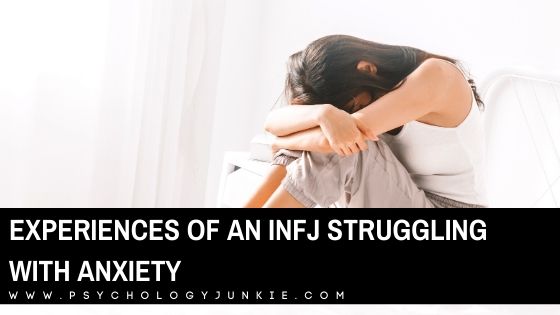
This article contains affiliate links. If you purchase an eBook from one of my links I get a small percentage back to help run my site.
My anxiety story
My first panic attack happened when I was high-school-aged, about 15 years ago. My heart was racing, hands shaking, breathing shallow. I felt hot all over and my skin seemed too small. I didn’t know what was going on, and neither did the people around me. My mom and sister just thought I was overreacting about something and seemed angry.
Things didn’t get much better over the next few years. While I was in college struggling to handle the social side of everything, I read Susan Cain’s Quiet: The Power of Introverts In A World That Won’t Stop Talking and Elaine Aron’s The Highly Sensitive Person: How to Thrive When the World Overwhelms You. Both helped me manage my feelings of being overwhelmed, and I found ways of accommodating or working around my sensitives. That also helped with my anxiety to a certain extent since I was less stressed overall and I was avoiding a lot of the things that triggered my anxiety.
It didn’t fix everything, though. I started feeling guilty for thinking of myself as anxious, especially when I compared my experiences with anxiety with those I read about on other people’s blogs. Mine didn’t seem as bad as theirs. Maybe I was just a wimp who didn’t know how to handle normal life and was overeating to every day worries.
I thought about seeking counseling off-and-on throughout college but never convinced myself my struggles were serious enough for that. It wasn’t until 2018, when my first serious romantic relationship was falling apart after only 9 months, that I hit a point where I couldn’t function. Depression isn’t the subject of this blog post, but it often occurs alongside anxiety and I had symptoms of both at this time. I needed help, and I found it in a Christian counselor who specialized in Cognitive Behavioral Therapy. I counseled with her for about a year before she moved on to a different practice, and that year did wonders for helping me understand and manage my anxiety.
Anxiety and the INFJ
So what does this have to do with being an INFJ? Everyone, regardless of personality type, experiences occasional anxiety. And dealing with an anxiety disorder isn’t exclusive to any one type either. I have noticed, though, that quite a high number of INFJs I talk with struggle with anxiety to a certain extent.
If you’re an INFJ struggling with anxiety, that anxiety will interact with your INFJ personality traits in some unique ways. Anxiety is different for everyone, whether or not you share a personality type, but I do think there are certain ways anxiety is more likely to show up for INFJs. Keep in mind, though, that what I’m sharing here is mostly based on my personal experiences. By focusing specifically on my experiences with anxiety as an INFJ, I have no intention of down-playing any other type’s struggles. My hope is simply to offer support, understanding, and possibly some help to other INFJs who are struggling with similar issues.
I’m not a counselor or therapist and this article can’t be used to diagnose anxiety or as a treatment guide. If you’re struggling with anxiety, I highly recommend seeing a therapist, counselor, or other psychology/medical professional. I can assure you from experience that trying to deal with a mental health issue on your own is not a good idea. Please go get proper help.
Experiences with INFJ anxiety
Here are four things that I’ve noticed about anxiety that I think is connected with how we experience the world as INFJs. Keep in mind that anxiety looks a little different for everyone. If you don’t identify with all the experiences listed here, that doesn’t mean you don’t have anxiety or that you’re not an INFJ.
1) It can make you defensive
INFJs are typically an easy-going type that values harmony too highly to trigger conflicts with other people. Stress, however, can make us see the outer world as a hostile, dangerous place. When you layer that with anxiety, an INFJ can end up feeling very defensive. They might lash out with uncharacteristic anger or say things that hurt others in an effort to get them to back off and give the INFJ space. It took me a long time to figure out that my uncharacteristic expressions of anger were rooted in fear and anxiety, and to find ways to deal with that in a healthier fashion.
2) You might isolate yourself more
Even though we’re introverts, INFJs do need other people. All introverts do to a certain extent, but FJ types are particularly people-oriented. If you’re struggling with anxiety, though, you’re probably going to avoid other people more than an INFJ would under normal circumstances. Even if you do get into a social situation, anxiety can make you hang back from others and then be misinterpreted as aloof, bored, or unsocial. There’s no easy cure for this. I’ve found, though, that it only gets worse if you stay isolated and that it’s important to push yourself to keep interacting with others. It can get easier to build connections with people, especially with support from a counselor and/or friends who understand what you’re going through.
3) It affects how you see the world
I already mentioned that stressed INFJs tend to see the world as a hostile place. This doesn’t always make us lash out. Instead, or in addition to that, we can become more careful about trying to control the world around us. Many INFJs already have perfectionistic tendencies and we like to maintain order in the outer world. Anxiety can just exacerbate that, and we may feel we need to be prepared for anything that might happen. Also, never ask an anxious INFJ, “What’s the worst that could happen?” We have too good an imagination not to instantly come up with multiple scenarios for imminent doom.
4) It can block how you read other people and yourself
Like other FJ types, one of an INFJ’s favorite functions is Extroverted Feeling. Because their feeling function is turned outward, INFJs often have a much easier time picking up on other people’s emotions than their own. Anxiety tends to make it harder for us to do either of those things. It’s not easy to read people when your brain is imagining worst-case scenarios related to how they perceive you. It’s also harder to process your emotions in a healthy way because you’re in fight-flight-or-freeze mode.
Your turn
Are you an INFJ who struggles with anxiety? What are some of the issues you’ve struggled with, and how do you think anxiety has affected your personality?
About the Author:
Marissa Baker is the author of The INFJ Handbook (available in the Amazon Kindle Store). You can find her online at LikeAnAnchor.com where she blogs about personal growth and development from a Christian perspective.



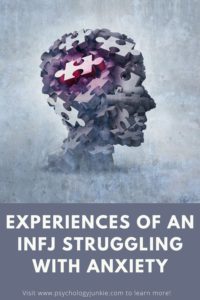




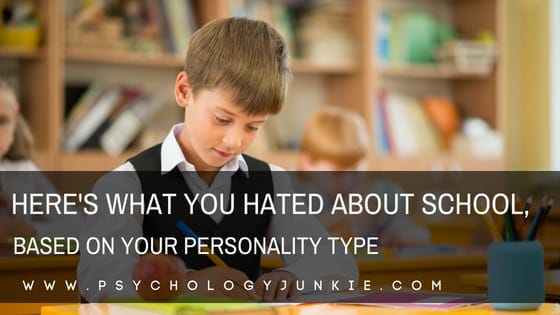


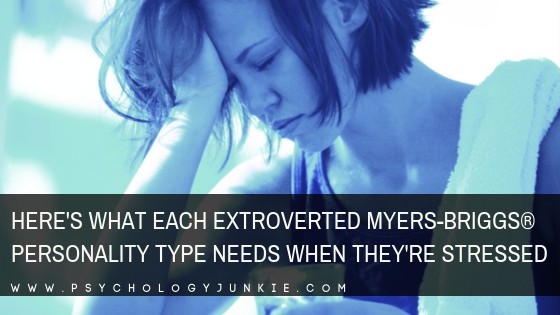
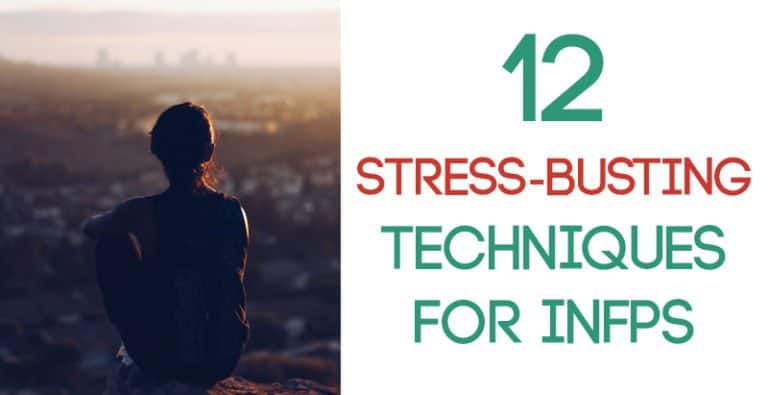
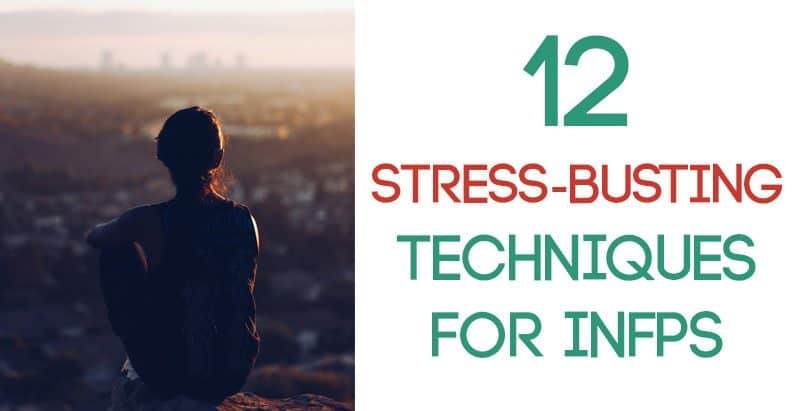
Take this not as a competition, but as a confirmation. I always thought that I was an INFP, but recently I’m thinking that I’m more of an INFJ. I started with depression in high school. In my 20s came the clinical anxiety. In my late 30s that manifested as agoraphobia, and in my mid to late 40s, it became evident that I have PTSD. So much of this post rang true for me, especially the isolation. I’m working through it with a fantastic therapist, but I think it will be with me for the rest of my life.
An INFJ experiencing anxiety should definitely try Vipassana mediation. It’s a Buddhist technique, but compatible with Christianity.
Firstly, there is absolutely no scientific basis to back Mayers-Biggs types. In short it is a scam, so how can people base their lives and write books about rhis?
Everything based on this is floating on sands
then why do you read them? there is also no scientific basis evidence to prove the opposite is true…
If you don’t agree, then don’t comment. What are you trying to prove?
If that’s true then why did a Forbes article “How The MBTI Can Help You Build A Stronger Company” wrote that “about 80% of Fortune 100 companies rely on these types of tests to build stronger, more effective teams and healthier organizations.”
Sounds like you never worked at one of those 80% companies, otherwise your personal opinion about not taking the MBTI test when submitting your job application to one those highly successful companies would had failed in their application requirement.
It seems there is a “real world” belief that MTBI is a science and some large corporations require you to take the MBTI test to qualify to work in their high salary organizations.
Firstly, when you use “firstly” there is supposed to be a “secondly” as well.
Secondly, people write books about things that don’t exist all the time. It’s called fiction, and it’s very popular.
Thirdly, if you don’t find it helpful that’s okay. It’s not for everyone. But please reconsider next time before you go hating on something that has actually helped people and has in no way harmed you.
That is amazingly close to how I experience anxiety.
It’s nice to know that I’m not the only one who experiences the world in a similar way to me… the world is a strange place I dont understand
Anxiety is also a byproduct of having “Screen Addiction.” You can just go outside and see people are walking around constantly with their heads glued to their cellphones. Take a “Screen Addiction” quiz online to see how addicted you’ve become to your cellphone and social media’s dopamine hits and read about the symptoms.
Otherwise, having a strong boundary is like having an invisible psychological shield all around you that everyday stress bounces off of it. If you have too many holes (blind spots), stress can get thru that hole inside your boundary, and then you own it. You heard of the metaphor having “thin skin” or she has “thick skin?” What is “skin?” It’s your psychological boundary. Thin skin is having too many holes (if someone can easily push your button, and trigger a reaction from you…that’s a hole in your boundary), having too many holes makes a person overly sensitive and gets easily overwhelmed by stress (i.e. panic attacks). Having thick skin is having a wall around you that nobody can hurt you, but it starves that person of precious emotional energy that one gets thru close intimacy.
You want to have doors in your boundary so you can open it to win/win interactions or close the door to win/lose interaction. Plus, patching up your holes so stress doesn’t get thru your boundary, how can you know if you have a hole in your boundary? When someone pushes your button.
INFJs love harmony, so owning a boundary is difficult concept for us, we don’t like saying “no” to other people and to hurt their feelings. So it’s vital, especially for INFJs to get their hands on as many books and video seminars you can about boundary functions… to exercise that boundary muscle. You know when you switch from an “external locus of control” to an” internal locus of control,” that you just passed your INFJ’s puberty stage.
~INFJ-A
p.s. the antidote to anxiety is to having confidence and courage.
Thank you for sharing that. Never heard about doors in boundaries before but that makes a lot of sense.
Just wanted to let you know that your brilliant writing helped me manage a difficult time in a much healthier way – thank you
Hi Marissa,
Thanks so much for this blog post. It was helpful, affirming, comforting and really well written!
I also identify with your Christian belief which I need to hear more of especially from who have an INJF personality type.
My anxiety is at an all time high lately and just want to learn more about how this relates to be an INFJ. Thanks for this good information. Have a great day! 🙂